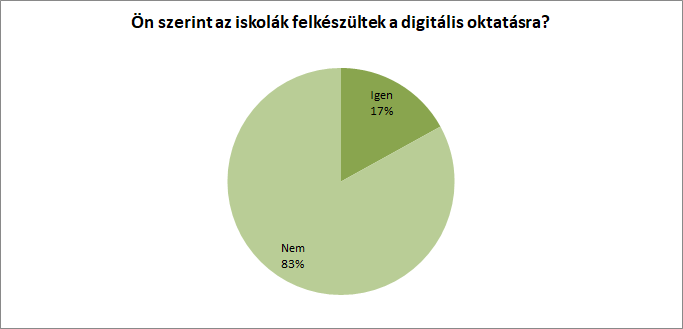
Two thirds of Hungarian parents dissatisfied with digital education
Two-thirds of parents are dissatisfied with digital education, according to a spring survey of 2,500 respondents in Hungary.
Although the summer holidays are well under way, the public is still concerned about the experiences and lessons that can be learned from the forced fast-track introduction of online education in schools.
Parents of primary school children have themselves been actively involved in the education process during the emergency caused by the coronavirus. The Parents Together for Our Children's Future community conducted an online survey of them in spring 2020 - their views and experiences can help shape digital education.
A total of 2,499 questionnaires were sent in, with an approximately equal share from the capital (28.5%), large rural cities (22.5%), small towns (23.6%) and villages (23.2%).
A large majority of parents (83%) believe that schools are unprepared for the transition to digital education.
Although many have access to the internet, the proportion of those with insufficient bandwidth is 10% in Budapest and 20.5% in rural areas.
81% of those surveyed have sufficient digital devices (computer, tablet, smartphone) to participate in digital education, but platforms and their use were new for most teachers and students.
78% of parents said that their child had not been taught at school how to use a computer or smartphone independently for digital education, nor how to use the programs and applications.
46% of parents said that their child had been informed at school about the dangers of the internet and how to use it safely.
Schools have tried to find ways to keep virtual classrooms as soon as possible to deliver the curriculum to students. According to 71% of parents, schools have created a common platform (e.g. Google Classroom) for digital education, mostly hold online lessons and alternative methods of assessment (e.g. Redmenta).
Where a single platform was not established, it was the case that the number of teachers meant that the children received the material from different platforms. This makes the students' work more difficult.
The methods used are very different in Budapest and in the countryside. In Budapest, alternative methods and unified platforms are much more prevalent, in the villages much less.
This may be one of the reasons why parents in rural areas are more concerned that their children may not be able to complete the school year successfully.
More than half of parents - 46 in Budapest and around 60% in rural areas - are worried that their child will fall behind.
What is the reason?
Although there is a possibility to assign tasks on CREDIT, the site is very inflexible.
There is no possibility to have video or "real-time" lessons, to write assignments. The curriculum is based on traditional offline textbooks, which is very difficult to manage in an online learning format.
So schools - or teachers, if they could not do it uniformly - had to invent themselves very quickly and choose the format that best suited them. This could have been done much earlier, even as part of teacher training - we hope that more emphasis will be put on this afterwards. However, a good number of teachers have taken the challenge well and adapted quickly to the situation.
However, this has taken time and there are elements of digital education that have clearly not been taken into account.
Although teachers would have the opportunity to consult each other virtually about the overall workload of the children, this is not happening in most cases. Teachers work as independent "islands". This takes its toll on the children in the form of many more tasks than average.
Despite this, many teachers are not flexible and are strict about meeting deadlines. And yet 90% of parents say that they do not expect students to make the same progress as if they were in school.
The system also places a heavy burden on parents, as children need much more help, both technically and with learning. Most children can only learn at home with parental support. At primary level, independent learning is a problem for children and the presence of a parent is essential.
On average, a child spends nearly three hours learning on his or her own, and at least 2 hours with parental help. Not all families can manage this on a continuous basis. For most, at least one parent - 80 per cent in Budapest, 60 per cent in rural towns and 50 per cent in villages - worked from home, but the need to spend more time with children can be at the expense of work.
The situation in rural areas is also significantly less favourable than in Budapest.
Extracurricular learning was also mentally stressful for pupils, according to ¾ of parents, and few teachers were able to devote time to dealing with it. Here again, the difference between the capital and the countryside is significant: while 35 % of pupils in Budapest had received such help, only 27 % of those in the countryside had.
Overall, ⅔ of parents are dissatisfied with digital education - but there is a wide variation in textual opinions. After analysing the questionnaire, it is worth reviewing the more than 1,800 text comments received to see what parents felt was important to note.
Many thank the teachers for the quick changeover and for their superhuman work:
"Respect and thanks to the teachers for their quick adaptation!"
They complain that education authorities have not given time to make the transition, even though neither teachers, parents nor pupils were prepared for digital education. Both teachers and parents were left to their own devices.
Parents perceive the differences between teachers:
"Those teachers who were creative in traditional education are still creative now, those who were lazy are copying"
"whoever was a Teacher before is still a Human in this situation"
Many praised their own teachers:
"We have nice teachers and that's what counts."
"if it weren't for them, we would have gone mad"
"We have a very good staff in the school, they help a lot, they don't want to continue the school year as before."
Some were particularly happy with the new system:
"I would choose this form of education forever if I could because the children finally have time for free play!"
"With 4 of my children, I find that they are more focused, concentrated and enthusiastic learners."
But the majority of respondents are dissatisfied. Many complained that there is no digital education, only assignments are given out in classroom, in KRETA, by e-mail or only in photocopies without explanation:
"read, interpret and solve the exercises"
"the whole digital education is just giving homework"
"in the morning we receive the daily assignments by e-mail, then in the evening we e-mail he photocopied, scanned notebooks, and workbooks"
"It's not digital education, it's homeschooling"
"Digital allocation of tasks"
"in some places digital education means that photocopies are taken out once a week."
In many cases, assignments need to be tracked on multiple platforms and handed in elsewhere. But there are also examples of
"a closed Facebook group is used to 'stream' the lesson."
In others, there are attempts to "digitise" face-to-face lessons.
In the text assessment, many parents stress that
"Unfortunately, we have to learn a lot of material with little time."
"Too much curriculum is poured on them"
"Overwhelming amount. Even my 7th grader can't do it alone. He sits in front of a computer for 6-7 hours."
According to parents, this form of teaching is totally unacceptable in lower school. On the one hand, the use of digital tools is considered premature, but even more often there are indications that the tasks posted are a major effort for parents and not a task tailored to them:
"I can't imagine how my non-teaching parents can pass on the basic knowledge on which our children's future depends."
"They're too young to listen to a crackling speech, to what is written out, and to do the tasks at the same time."
"It's unrealistic to expect children in primary school to learn independently."
The problem is even greater for students with special education needs, who have not received special education or development, and expectations are not aligned with their special situation:
"It is very demanding for children with special educational needs. There is no special help, the expectation is the same as if the child was not at home."
Many complained that as parents they had to become teachers, they had to spend a lot of time helping children in addition to their work:
"We have become a country of a million home-schoolers, and a million parents (mainly mothers) have to teach at home as bumbling teachers, at the expense of the mother-child relationship, instead of 5-6 teachers per child, and to monitor, document and upload all this, while we are also aunts in the mothers' room and should do our own work at home."
"I have 5 school children. 3 can't work independently."
"If I hadn't lost my job because of the virus, my lower schooler would be failing."
Teachers often did not take into account that the parent was working:
"I have to sit there with my primary child and because I work, we can only start learning in the afternoon. We can't get her photocopied workbook in by 6pm, when it needs to be emailed, so it's considered unverified."
Those who can only use a smartphone found it difficult: you can't learn on it like you can on a laptop or computer.
Parents who have been forced into the role of teacher have often only just been confronted with the problems that exist in the classroom. They complain about the excessive amount of material, outdated curricula, the quality of textbooks and the inflexibility of the system.
Many respondents hope that the experience of the present will have an impact on the future:
"You can't teach the same way from next year!"
Those who have had good experiences are confident that the tried and tested elements will remain in use:
"It worked very well for us, I think this 'experiment' will change future teaching."
"some of what we are learning now should definitely be transferred to 'normal' education."
Others formulate lessons to be learned:
"methodological knowledge and appropriate time and learning management are needed."
"those who are left behind have no tools, no knowledge, no motivation, no appropriate conditions"
"After the epidemic, the experience gained should be used to seriously develop digital education, and classical education should also benefit from the experience gained."
